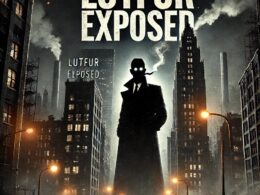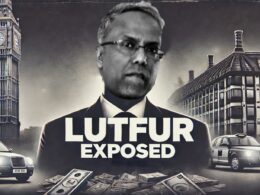The scandal surrounding Tower Hamlets Council and the closure of Club Oops in Whitechapel is a dark tale of alleged corruption, abuse of power, and public betrayal that has rocked the borough. At the centre of it is an accusation that Councillor Amin Rahman, affiliated with the Aspire party, demanded a substantial bribe from club owner Santosh Nair in exchange for renewing his business license. This allegation is serious enough on its own, but the council’s response—or lack thereof—has only deepened suspicions of foul play and a cover-up.
Nair’s business, a legally operated strip club contributing to the local economy, found itself in the crosshairs when a routine license renewal suddenly became a vehicle for an alleged shakedown. According to Nair, Councillor Rahman reached out to his associate, Abdul Ali, demanding a bribe to “take care” of the licensing issue. The initial request reportedly escalated, with Rahman allegedly suggesting sums as high as £80,000 to £100,000 to grease the wheels. Rahman allegedly justified these staggering sums by claiming there were “more mouths to feed,” implying a network of complicity within the council.
But what has Tower Hamlets Council done to address these accusations? In response to Nair’s allegations, the council conducted two internal investigations and engaged the Metropolitan Police, all of which concluded there was “insufficient evidence” to support any claims of bribery. To the public, this conclusion feels hollow. Here we have recorded conversations allegedly detailing Rahman’s bribe demands, yet the council insists there’s no actionable evidence. If anything, their response has only deepened the public’s skepticism. How is it possible that so many layers of investigation yielded no actionable findings, despite a recorded demand for money?
When Nair took his case to the High Court, seeking justice and financial compensation for his lost income, the council’s response was even more perplexing. Rather than stand firm on the results of their investigations, Tower Hamlets Council opted to settle, agreeing to pay damages for over a year’s worth of lost business and covering Nair’s legal costs. A council spokesperson was quick to clarify that “the judgement made no findings against the council,” but that assurance rings hollow. If the council genuinely believed there was no wrongdoing, why would they capitulate? Why would they settle, using taxpayer money, if they were confident that these allegations were baseless?
Further complicating the council’s position is its subsequent decision to hand over the matter to an independent investigator, following recommendations from their Standards Advisory Committee. This move, while ostensibly meant to reinforce transparency, appears to be yet another exercise in delay. Tower Hamlets Labour Councillor Marc Francis has openly criticized the council’s handling of the issue, calling for Whitehall’s “Best Value” inspectors to intervene. In his view, the council’s willingness to settle suggests serious governance failures that demand external oversight.
Meanwhile, the independent investigation has been moving at a glacial pace, with the council admitting to “slow progress” in obtaining findings. For residents and business owners in Tower Hamlets, this delay is salt in the wound. It is yet another signal that the council is more focused on managing the fallout than addressing the root issue. If Councillor Rahman did indeed solicit bribes, where is the accountability? If he didn’t, why hasn’t the council transparently cleared him? Instead, Tower Hamlets remains mired in opacity, leaving residents to wonder whether their leaders are more committed to protecting themselves than to upholding the public trust.
This scandal has exposed a culture of alleged corruption that runs deep within Tower Hamlets Council. Nair’s case is not just about one business owner fighting for his livelihood; it’s about a public office allegedly being wielded as a personal cash cow by those entrusted to serve the community. The council’s inconsistent responses—settling the lawsuit while denying wrongdoing, launching investigations that yield nothing, then stalling an independent review—have all but eroded any credibility it might have had.
For the people of Tower Hamlets, this fiasco must be a wake-up call. Their elected officials are there to serve them, not themselves. Local government is supposed to be the closest reflection of democratic accountability, yet here we see it twisted into a cloak for alleged corruption. Tower Hamlets residents deserve transparency, they deserve action, and they deserve leaders who respect the gravity of public service. Each day that this scandal lingers unresolved is another day that Tower Hamlets Council sinks deeper into disrepute.
It’s time for Tower Hamlets to make real changes, starting with a thorough and genuinely independent investigation—no more internal reviews, no more slow-walked external inquiries. If the council cannot manage this, it should not manage the borough. Public service is a privilege, not a get-rich-quick scheme. The people of Tower Hamlets deserve nothing less than the full truth, accountability, and leaders who will prioritize the public’s trust over their own interests.








